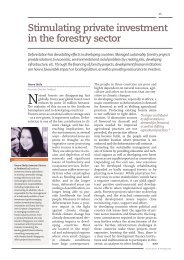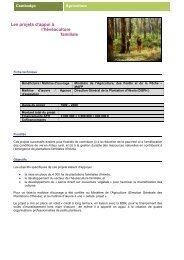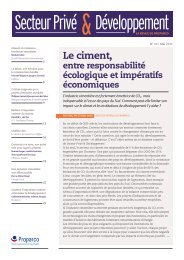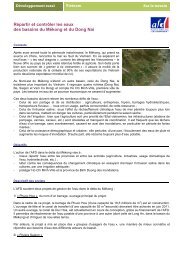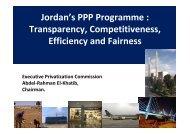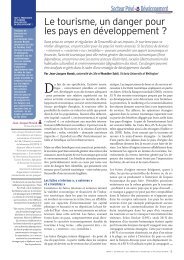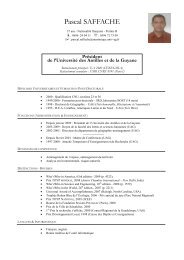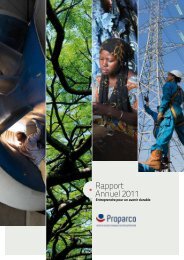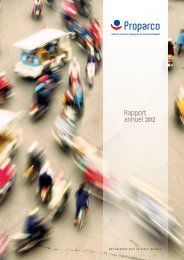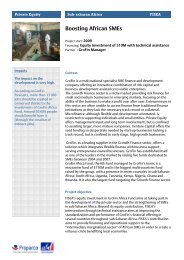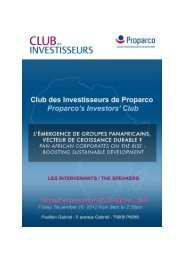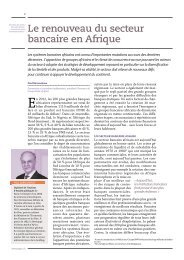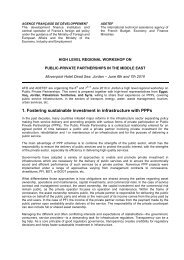Download Cyrille Nkontchou's paper - Proparco
Download Cyrille Nkontchou's paper - Proparco
Download Cyrille Nkontchou's paper - Proparco
You also want an ePaper? Increase the reach of your titles
YUMPU automatically turns print PDFs into web optimized ePapers that Google loves.
AFRICA’S<br />
FINANCIAL MARKETS:<br />
A REAL<br />
DEVELOPMENT TOOL<br />
Enko Capital<br />
Management LLP is<br />
an Africa-focused<br />
asset management<br />
firm with offices<br />
in London and<br />
Johannesburg. It<br />
manages two funds,<br />
an open-ended<br />
fund investing in<br />
listed securities<br />
across Africa and a<br />
closed-end, pre-IPO<br />
private equity fund<br />
that will invest in<br />
fast-growing African<br />
companies wishing<br />
to list on an African<br />
stock exchange.<br />
Founding member,<br />
Cyril Nkontchou,<br />
will analyse recent<br />
evolution of African<br />
financial markets<br />
and observe their<br />
increased role in<br />
providing capital to<br />
the private sector.<br />
<strong>Cyrille</strong> Nkontchou<br />
Enko Capital<br />
<strong>Cyrille</strong> Nkontchou is the<br />
founder and managing partner<br />
of Enko Capital Management<br />
LLP, an Africa-focused asset<br />
management firm with<br />
offices in Johannesburg and<br />
London. He is also the founder<br />
and executive chairman<br />
of LiquidAfrica Holdings<br />
Limited. He started his career<br />
as a consultant with Andersen<br />
Consulting (now Accenture)<br />
in France, and worked as a<br />
banker with Merrill Lynch in<br />
London. He holds a degree<br />
in Economics from Institut<br />
d’Études Politiques de Paris<br />
and an MBA from the Harvard<br />
Business School.<br />
1<br />
Pre-IPO placements refer<br />
to initiatives from investors<br />
to acquire capital shares of<br />
firms before their introduction<br />
on the stock exchange. These<br />
transactions are aimed at<br />
benefiting from a substantial<br />
upside by selling the acquired<br />
shares after the IPO (resulting<br />
from oversubscriptions and an<br />
increase in share prices).<br />
Recent Evolution of the<br />
African Financial Markets<br />
Financial markets play an increasingly important role in financing Africa’s private<br />
sector. Their recent growth in strength is unquestionable – despite the sudden standstill<br />
caused by the 2008 crisis: sixfold increase in capital flows in 10 years, opening of stock<br />
markets, initial public offerings by public and private companies, etc. If these markets<br />
are to continue to develop, it is essential to free up African savings – which are trapped<br />
by low-return assets and the lack of quality products – and to learn to attract higher<br />
portfolio investment flows.<br />
By <strong>Cyrille</strong> Nkontchou, Managing Partner of Enko Capital Management LLP<br />
The first decade of the 21 st century has seen<br />
a sixfold increase in private capital flows in<br />
Sub-Saharan Africa. Foreign direct investment<br />
in Africa has traditionally been dominated by<br />
large multinationals mainly investing in resources<br />
projects, but the second half of this decade has<br />
witnessed the emergence of financial markets as a<br />
major source of finance for investments. Between<br />
2007 and 2009, USD 10 billion of equity capital<br />
was raised on local African stock exchanges. Many<br />
first-time issuers such as Gabon and Ghana successfully<br />
raised debt sovereign bonds on the international<br />
market.<br />
The financial markets are playing an increasingly<br />
important role in providing capital for the private<br />
sector in Sub-Saharan Africa, particularly in the<br />
financial services and telecommunication sectors.<br />
They are also playing a pivotal role in providing alternative<br />
investment opportunities for local savings,<br />
as seen in Nigeria where the bulk of the recapitalisation<br />
of the banking sector was achieved<br />
by channelling local savings into the stock market.<br />
However, despite recent successes, the development<br />
of African financial markets is hindered by<br />
a lack of accurate data, preventing both governments<br />
and development institutions from implementing<br />
adequate policies.<br />
The rise of financial markets<br />
in Sub-Saharan Africa<br />
The second half of this decade has witnessed a<br />
remarkable growth in African financial markets.<br />
The number of stock exchanges has risen from a<br />
dozen in the early 90s to over 23 today, including<br />
two regional stock exchanges. Over two-thirds of<br />
African countries are covered by a local or regional<br />
stock exchange.<br />
With less than 2000 listed companies across all<br />
African markets (compared with 3500 for India<br />
alone, and 1700 for China), the number of companies<br />
that have tapped into the capital markets<br />
to fund their growth remains relatively small.<br />
However, over the past three years, we have witnessed<br />
an acceleration in the number of African<br />
companies going public. Between 2007 and 2009,<br />
over USD 10 billion of share capital was raised<br />
across 18 stock exchanges, mostly thanks to the<br />
listing of 170 new companies. The market capitalisation<br />
of the 10 largest markets grew from USD<br />
222 billion to over USD 700 billion between 2002<br />
and 2008, a compound annual growth rate (CAGR)<br />
of 18%. In Nigeria, the recapitalisation of the<br />
banking sector between 2005 and 2008 attracted<br />
over USD 4 billion of new investment through the<br />
stock market, mainly from local investors. The<br />
strong aftermarket performance of initial public<br />
offerings (IPOs) in Africa drew even more investors<br />
into pre-IPO investments. In Nigeria alone<br />
between 2007 and 2009, over USD 8 billion of<br />
equity capital was raised in such pre-IPO private<br />
placements 1 .<br />
Increased investor appetite for shares in utility<br />
companies such as Kengen and Safaricom in<br />
Kenya and banks such as Zanaco in Zambia allowed<br />
African states to benefit by successfully<br />
offloading large stakes in these companies. They<br />
also took advantage of the renewed investor appetite<br />
for African sovereign credit to raise bonds<br />
on the international market. The Government of<br />
Ghana raised USD 750 million in debt sovereign<br />
bonds, while the Republic of Gabon successfully<br />
raised a USD 1 billion 10-year bond on the international<br />
market. The Government of Seychelles<br />
raised a USD 230 million three-year bond. In effect,<br />
these flows enhance governments’ financing<br />
capacities and constitute fresh money for public<br />
investments.<br />
The rise in African financial markets was underpinned<br />
by improved macroeconomic fundamentals<br />
in the region, but also by a stellar performance<br />
of African stock markets during that period.<br />
...<br />
ISSUE 5 - MARCH 2010 - AFRICA’S FINANCIAL MARKETS: A REAL DEVELOPMENT TOOL 3
Recent Evolution of the African Financial Markets<br />
By <strong>Cyrille</strong> Nkontchou, Managing Partner of Enko Capital Management LLP<br />
...<br />
One of the most visible positive impacts of<br />
the rise of African financial markets in the past<br />
few years has been the recapitalisation of the<br />
banking and insurance sectors in Nigeria. On the<br />
other hand, the sector recently experienced troubles<br />
as the newly recapitalised banks aggressively<br />
started to provide loans to finance the purchase<br />
of shares in an inflated stock market. The global<br />
market meltdown in 2008 clearly put a brake on<br />
the exuberance of African financial markets. New<br />
issuance decreased dramatically as local stock<br />
markets indices collapsed. Foreign portfolio investors<br />
shied away from African markets and began<br />
returning cautiously in 2009, but only in the most<br />
advanced and liquid markets, such as South Africa<br />
and Egypt. The recent successful IPO of the CFAO<br />
group 2 in Paris however suggests that there is a renewed<br />
appetite for quality African assets among<br />
emerging market investors.<br />
Unlocking trapped African savings<br />
The rise of financial markets in Sub-Saharan Africa<br />
over the past few years has uncovered the importance<br />
of the often underestimated role of African<br />
investors eager to invest in financial assets.<br />
Among the sources of funds available for investment<br />
on African stock exchanges – some of which<br />
are not well utilised at present – are the following:<br />
(1) individual savings (for example, wealthy<br />
Nigerians), (2) funds collected by institutional investors<br />
(insurance companies and pension funds)<br />
and (3) funds deriving from loans given by banks<br />
to their clients for helping them to invest on the<br />
markets (margin loans).<br />
The recapitalisation of the financial sector in<br />
Nigeria was a case in point. The decision in 2004<br />
by the governor of the Central Bank of Nigeria to<br />
raise the minimum capital requirement for banks<br />
licensed in Nigeria to USD 250 million by<br />
December 2005 was initially met with scepticism.<br />
But most observers underestimated the pool of<br />
local African savings trapped in sub-optimal investment<br />
products 3 as a result of a relative lack of<br />
available assets in African financial markets. ...<br />
Table 1: Subscription levels of African IPOs, 2009<br />
Company Sector Country<br />
2<br />
The Compagnie française de l’Afrique occidentale (CFAO),<br />
a subsidiary of the Pinault-Printemps-Laredoute group,<br />
is the leader in specialised distribution in Africa and the French<br />
Overseas Collectivities (Collectivités d’outre-mer). The English<br />
translation for CFAO is French Occidental Africa Company.<br />
3<br />
Such products are sub-optimal because they can provide relatively<br />
low returns for investors and/or low impacts on the local private<br />
sector. Examples of these are sight deposits, treasury bills (shortterm),<br />
funds to be invested abroad, etc.<br />
Issue Size<br />
(USD million)<br />
Compagnie Generale Immobilier Real Estate Morocco 426 142x<br />
Taalat Moustafa Real Estate Egypt 688 41x<br />
Maridive Oil Services Egypt 278 31x<br />
Alliances Development Immob. Real Estate Morocco 275 29x<br />
Delta Holdings Construction Morocco 129 22x<br />
GB Auto SAE Automobile Egypt 213 7x<br />
Dangote Flour Mills Food Nigeria 146 6x<br />
Kenya Reinsurance Insurance Kenya 34 4x<br />
Safaricom Telecom Kenya 786 4x<br />
AccessKenya IT Kenya 11 4x<br />
Stanbic Bank Banking Uganda 39 3x<br />
Celtel Telecom Zambia 174 2x<br />
National Microfinance Bank Banking Tanzania 53 1x<br />
Dangote Sugar Food Nigeria 404 1x<br />
Subscription<br />
Level<br />
Safaricom’s IPO was successful: the subscription level of 4 x means that subscribers proposed to acquire<br />
four times more shares than the number of shares that Safaricom was selling.<br />
Source: Enko Capital research, 2009<br />
ISSUE 5 - MARCH 2010 - AFRICA’S FINANCIAL MARKETS: A REAL DEVELOPMENT TOOL 4
Recent Evolution of the African Financial Markets<br />
By <strong>Cyrille</strong> Nkontchou, Managing Partner of Enko Capital Management LLP<br />
... Between 2005 and 2008, the banking sector recapitalisation<br />
was successfully achieved thanks to<br />
a combination of both private and public, primary<br />
and secondary issues mainly on the local market.<br />
These issues were mostly subscribed to by local<br />
institutions and individuals. There is evidence<br />
that many wealthy private Nigerian investors repatriated<br />
some of their offshore investments to<br />
participate in this recapitalisation.<br />
The importance of African savings available for<br />
quality financial assets is further evidenced by the<br />
level of oversubscription observed for many recent<br />
new IPOs on African stock markets (Table 1). This<br />
data indicates that apart from real estate and local<br />
government <strong>paper</strong> such as treasury bills, African<br />
investors have very few investment opportunities<br />
available. Moreover, local institutional investors<br />
such as insurance companies and pension funds<br />
are typically restricted from making investments<br />
outside of their home countries or monetary zone.<br />
As a result, a large pool of savings ideally suited<br />
to investment in financial markets is trapped. This<br />
increased appetite of African savers for local financial<br />
assets was further fuelled by local banks that<br />
in Nigeria, Kenya and Zambia provided personal<br />
loans to invest in the stock market (e.g. margins<br />
loans in Nigeria).<br />
Attracting emerging market portfolio flows<br />
Until the global market meltdown in 2008, African<br />
financial markets – particularly the more developed<br />
ones – have seen a steady rise in emerging<br />
market portfolios flows 4 (Table 2). In part, abundant<br />
global liquidity was responsible for the surge<br />
of private capital flows into Africa, but investors<br />
were also attracted by Sub-Saharan Africa’s recent<br />
solid macroeconomic performance, more<br />
stable political environments, and high expected<br />
returns, given increasing commodity prices. With<br />
the exception of South Africa, Egypt and to some<br />
extent Nigeria, emerging market portfolio flows<br />
have played a limited role as a source of investments<br />
in the local capital market. Investors of<br />
emerging market portfolio flows have been more<br />
actively investing in African debt securities, buying<br />
securities issued by many first-time sovereign<br />
issuers (Gabon, Ghana, Seychelles).<br />
The combined African equity markets account for<br />
about 12% of global emerging markets, but attract<br />
less than 2% of portfolio equity flows. This<br />
under allocation is mainly the result of a relatively<br />
poor liquidity in African markets and difficult access<br />
to quality financial information and research<br />
Table 2: Financial flows in Sub-Saharan Africa 2000 – Q1 2009<br />
(USD Billion)<br />
70<br />
60<br />
50<br />
40<br />
30<br />
20<br />
10<br />
0<br />
-10<br />
-20<br />
Aid<br />
Remittances<br />
Portfolio<br />
Foreign direct investment<br />
2000 2001 2002 2003 2004 2005 2006 2007 2008 2009<br />
Source: IMF, 2009 (2009 data are estimates)<br />
on many African companies and issuers. Despite<br />
their volatility, emerging market portfolio flows<br />
remain a vast untapped potential source of capital<br />
for frontier African markets.<br />
Supporting the development<br />
of African financial markets<br />
The importance and the impact of financial markets<br />
in Africa are often underestimated, if not<br />
overlooked. This is the result of a relative lack<br />
of understanding of African financial markets<br />
among governments and multilateral institutions,<br />
making it difficult for them to design appropriate<br />
and effective policies. The lack of timely and accurate<br />
data and the relative weakness of market<br />
participants is a major impediment to attracting<br />
emerging market portfolio flows. Governments<br />
should lead the way by further promoting the sale<br />
of state-owned assets through financial markets 5 ,<br />
create sovereign benchmarks to provide reference<br />
points for private sector borrowings and create<br />
fiscal incentives for investing in financial assets.<br />
Development agencies could also play a key role<br />
by investing in strengthening the capacity of market<br />
participants and by subscribing to and exiting<br />
from more investments via the financial market,<br />
in order to improve their liquidity. There needs to<br />
be a proactive approach to promoting the creation<br />
of more financial assets, including listed companies,<br />
corporate bonds issues, collective investment<br />
schemes, among others, to offer a broader<br />
investment spectrum to local savers. •<br />
4<br />
Emerging market portfolio<br />
flows refer mainly to the<br />
investment holdings of<br />
international investors in local<br />
securities (listed equities and<br />
long- and short-term debt) as<br />
opposed to direct investments<br />
by international investors in<br />
local assets, which are recorded<br />
as foreign direct investments.<br />
5<br />
On this subject, see Laurent<br />
Demey’s article on the political<br />
use of stock markets to promote<br />
privatisation programmes.<br />
ISSUE 5 - MARCH 2010 - AFRICA’S FINANCIAL MARKETS: A REAL DEVELOPMENT TOOL 5



